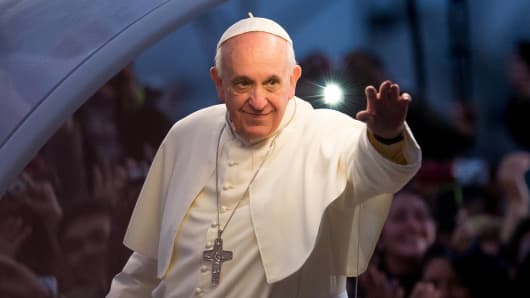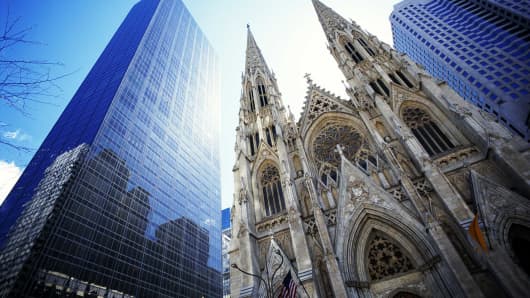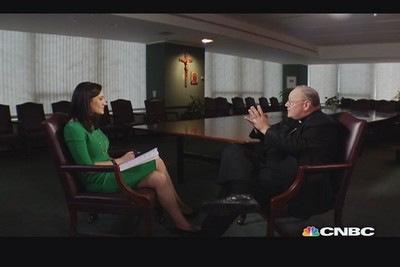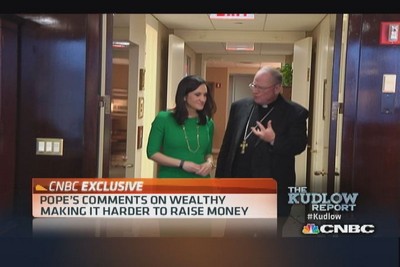
Where are biblical "literalists" when needed most?
***
At issue is an effort to raise $180 million for the restoration of St. Patrick's Cathedral in New York being spearheaded by billionaire Ken Langone, the investor known for founding Home Depot, among other things.
Langone told CNBC that one potential seven-figure donor is concerned about statements from the pope criticizing market economies as "exclusionary," urging the rich to give more to the poor and criticizing a "culture of prosperity" that leads some to become "incapable of feeling compassion for the poor."

Getty Images
Pope Francis on his way to attend the Via Crucis during World Youth Day celebrations in July in Rio de Janeiro.
Langone said he's raised the issue more than once with Cardinal Timothy Dolan, archbishop of New York, most recently at a breakfast in early December at which he updated him on fundraising progress.
"I've told the cardinal, 'Your Eminence, this is one more hurdle I hope we don't have to deal with. You want to be careful about generalities. Rich people in one country don't act the same as rich people in another country,' " he said.
Some of the statements in question are from Francis' first teaching, or "exhortation," a 224-page document issued in late November. In it, the pontiff criticizes what he calls "an economy of exclusion and inequality," blaming ideologies that "defend the absolute autonomy of the marketplace and financial speculation."
Dolan told CNBC that he had heard from Langone and said, " 'Well, Ken, that would be a misunderstanding of the Holy Father's message. The pope loves poor people. He also loves rich people.' ... So I said, 'Ken, thanks for bringing it to my attention. We've gotta correct to make sure this gentleman understands the Holy Father's message properly.' And then I think he's gonna say, 'Oh, OK. If that's the case, count me in for St. Patrick's Cathedral.' "
Neither Langone or Dolan revealed the name of the potential donor. The cardinal said he didn't know the person's identity, and Langone declined to name him, saying only that the individual was upset about the pope's comments about the rich being insensitive to the poor.
Dolan on free market
CNBC's Michelle Caruso-Cabrera talks to Cardinal Timothy Dolan, asking whether the Catholic Church supports a market- or a government-driven economy. Neither, the cardinal says.
In a speech in Brazil in July, Francis appealed "to those in possession of greater resources," saying that they should "never tire of working for a more just world, marked by greater solidarity. No one can remain insensitive to the inequalities that persist in the world."
It was unclear when Dolan may speak with the individual donor.
Langone, who describes himself as a devout Catholic who prays every morning, said he has told the cardinal that "you get more with honey than with vinegar." He said he also wants to make clear that wealthy Americans are some of the biggest donors in the world.
"There is no nation on earth that is so forthcoming, so giving," he said, adding that he hopes the pope can "celebrate a positive point of view rather than focusing on the negative."
The United States ranks No. 1 in the Charities Aid Foundation's most recent World Giving Index, with proportionally more Americans giving than the population of any other country.
Dolan said that the pope has expressed gratitude for American philanthropy.
"In the one long sit-down that I had with him, the Holy Father told me that he has a lot of gratitude for the generosity of the Catholic Church in the United States. He's aware of our help to the missions, to the poor of the world, to international development, to peace and ... justice," he said. "So, I know that he's very grateful for the ... legendary generosity of the Catholic Church in the United States."
Langone said he is also on a campaign to explain "the vast difference between the pope's experience in Argentina and how we are in America."
(Read more: Blunt Pope Francis targets free-market economics)
Francis is from Argentina, a country that suffered tremendous economic upheaval in early 2001 in what was then the largest sovereign default in history. Poverty rates skyrocketed overnight when the country refused assistance from the International Monetary Fund.
Arthur Brooks, head of the American Enterprise Institute, a think tank that promotes free markets, said he agrees that the pope's beliefs are likely informed by his Argentine heritage.
"In places like Argentina, what they call free enterprise is a combination of socialism and crony capitalism," he said.
Brooks, also a practicing Catholic who has read the pope's exhortation in its original Spanish, said that "taken as a whole, the exhortation is good and right and beautiful. But it's limited in its understanding of economics from the American context." He noted that Francis "is not an economist and not an American."

Michael Pasdzior | The image bank | Getty Images
St. Patrick's Cathedral in New York
"For American Catholics and Americans in general, we have a moral responsibility to the poor to spread the word of true free enterprise around the world," Brooks said. "By doing that, we have the best shot of meeting the Holy Father's objectives, which are good objectives."
He also thinks some of the English translation of the exhortation is inaccurate. For example, in one of its most talked-about passages about trickle-down economics, the Spanish version is softer than the English-language one.
The quote in English reads, "In this context, some people continue to defend trickle-down theories which assume that economic growth, encouraged by a free market, will inevitably [italics CNBC's] succeed in bringing about greater justice and inclusiveness in the world."
Pope's sharp words make a wealthy donor hesitate
Amid a $180 million renovation of St. Patrick's Cathedral, Cardinal Timothy Dolan of the Archdiocese of New York sits down with CNBC's Michelle Caruso-Cabrera to discuss Pope Francis's remarks about capitalism.
A better translation, Brooks said, would be "economic growth, encouraged by a free market alone, will succeed in bringing about greater justice." (This author speaks Spanish and agrees.)
"Of course a free market alone won't do the trick," he said.
A number of people, from Republican Sen. John McCain to conservative radio commentator Rush Limbaugh, have weighed in on Francis' statements, with the latter calling it "pure Marxism."
Dolan calls the Marxist label "hyperbole," telling CNBC that the pope thinks "money in itself is morally neutral. Money, our wealth, is a gift from God. And the morality comes in the way we use it.
"If it becomes a god, if it becomes an idol, Pope Francis is saying, then it's wrong. Because there is only one God. If we use it for our own selves and our families, for a secure and a safe present and future, if we use it to reinvest in the community, to help others, and if we share with the poor, then it's morally good," Dolan said.
—By CNBC's Michelle Caruso-Cabrera.

Another view of "the eye of a needle"
***
In the following video clip, New York City Cardinal Timothy Dolan offers his view of the "misunderstaning" between "the wealthy donor" and Pope Francis


No comments:
Post a Comment